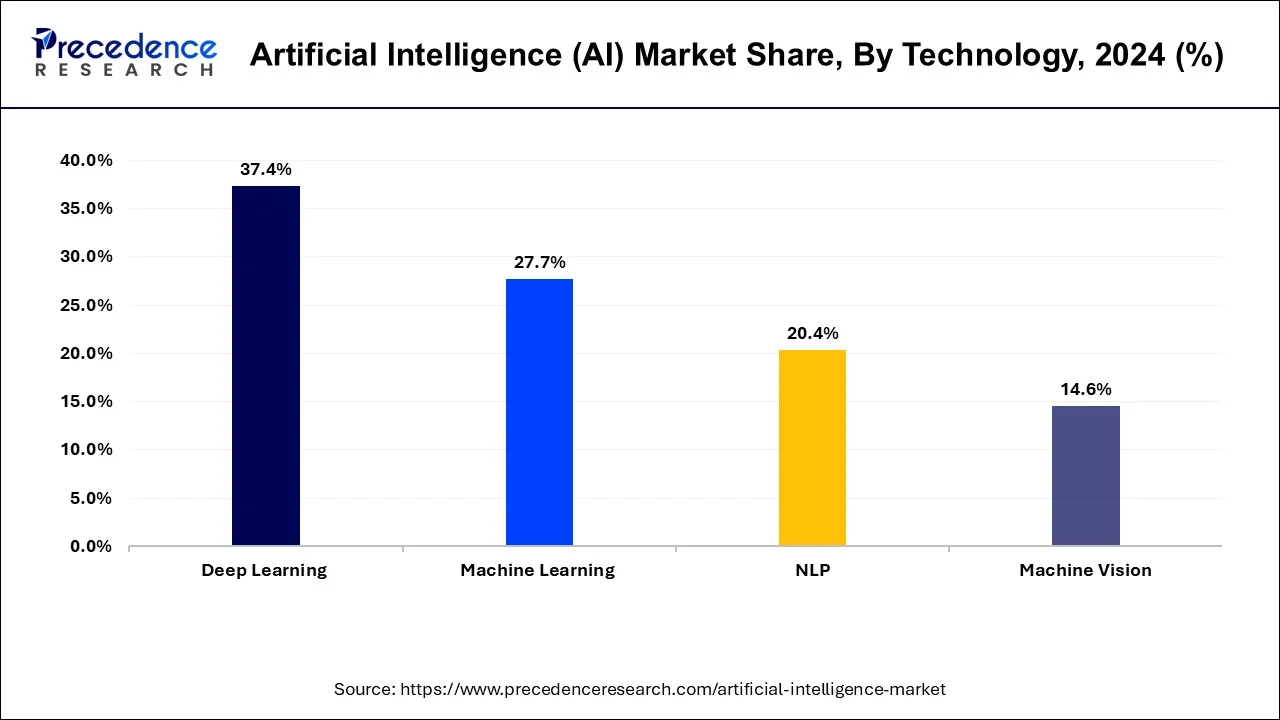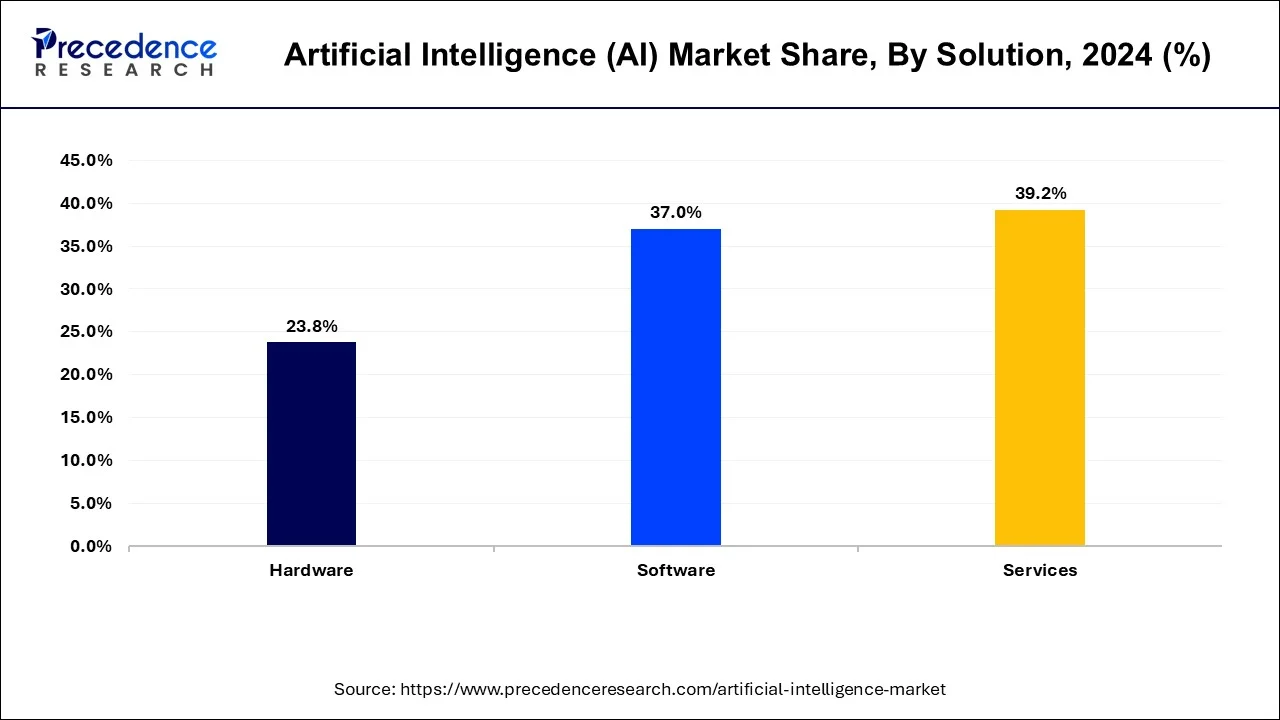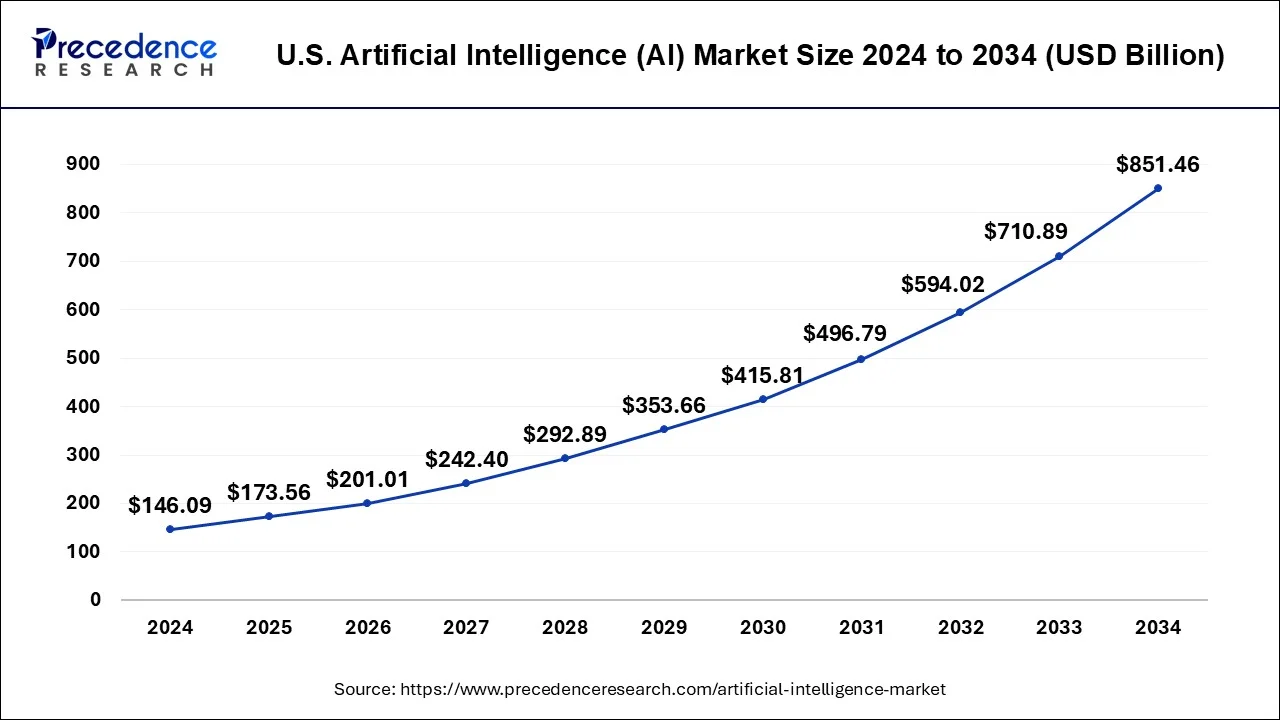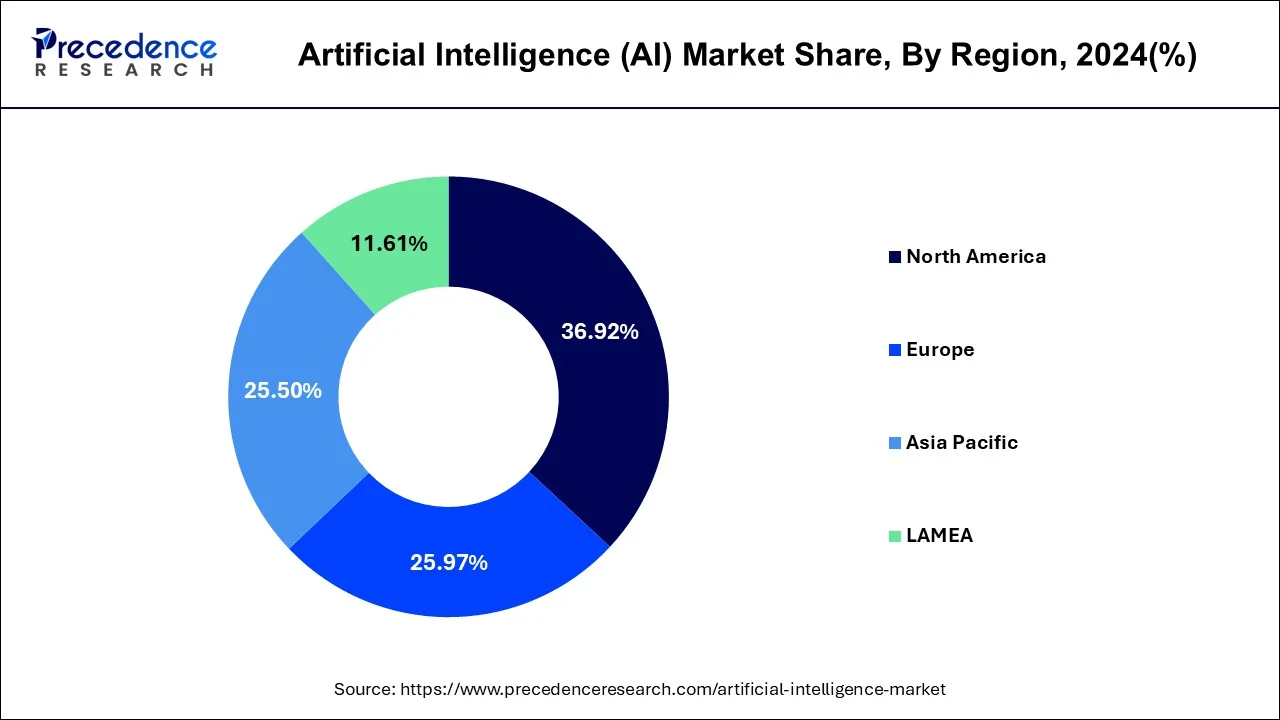List of Contents
- Last Updated : 29 Sep 2025
- Report Code : 1635
- Category : ICT
Artificial Intelligence (AI) Market Size and Growth 2025 to 2034
The global artificial intelligence (AI) market size was USD 638.23 billion in 2024, calculated at USD 638.23 billion in 2025 and is expected to reach around USD 3,680.47 billion by 2034, expanding at a CAGR of 19.20% from 2025 to 2034.

Market Highlights
- North America accounted for the largest market share, at 36.92%, in 2024.
- The Asia Pacific region is expected to grow at a notable CAGR of 19.8% from 2025 to 2034.
- By solution, the software segment held the biggest market share of 51.40% in 2024.
- By solution, the services segment is projected to expand at a significant CAGR of 18.30% from 2025 to 2034.
- By technology, the machine learning segment dominated the market with the largest share of 36.70% in 2024.
- By technology, the generative AI segment is expected to grow at a significant CAGR of 22.90% from 2025 to 2034.
- By function, the operations segment led the market with a major market share of 21.80% in 2024.
- By function, the cybersecurity segment is expected to grow at a significant CAGR of 20.40% over the projected period.
- By end-use, the BFSI segment led the market share of 19.60% in 2024.
- By end-use, the healthcare segment is expected to grow at a significant CAGR of 19.10% over the projected period.
Market Size and Forecast
- Market Size in 2024: USD 638.23 Billion
- Market Size in 2025: USD 757.58 Billion
- Forecasted Market Size by 2034: USD 3,680.47 Billion
- CAGR (2025-2034): 19.20%
- Largest Market in 2024: North America
- Fastest Growing Market: Asia Pacific
Artificial Intelligence (AI) Market Growth Factors
The rapid penetration of digital technologies and the internet has significantly contributed to the growth of the global artificial intelligence market in the past few years. The heavy investments by the tech giants in research and development are continuously fueling technological advancements in various industries. The burgeoning demand for artificial technology among the various end-use verticals such as automotive, healthcare, banking & finance, manufacturing, food and beverages, logistics, and retail is expected to significantly drive the growth of the global artificial intelligence market in the forthcoming years. Technological innovations have always been an important part of the majority of industries.
The rising popularity of various life-saving medical devices and the self-driving feature in the new electric vehicles is significantly boosting the growth of the AI market across the globe. The shifting focus of the globe towards the digitalization is positively impacting the market growth. The top global tech giants such as Google, Microsoft, IBM, Amazon, and Apple are increasing their investments in the upgradation and development of various applications of AI. The rising efforts of the tech giants towards improving the access to the AI is expected to foster the growth of the global AI market during the forecast period.
Favorable government initiatives are expected to impose a positive impact on industry growth. The establishment of subcommittees on machine learning and AI within the federal government has drawn the traction towards the AI industry. In 2020, The Government of India increased the spend for Digital India to $477 million to boost AI, internet of things (IoT), big data, cyber security, machine learning and robotics. The artificial intelligence market is expected to witness significant growth in the BFSI sector on account of data mining applications as there is an increase in the adoption of artificial intelligence solutions in data analytics, fraud detection, cybersecurity, and database systems.
End-use industries have started integrating artificial intelligence into their business processes to streamline their operations. The artificial intelligence technology is gaining momentum as it assists end-user organizations to become more efficient and result oriented. The growing adoption of artificial intelligence is encouraging new entrants to venture into the AI marketplace by offering niche application-specific products and solutions. Furthermore, companies are also taking several strategic initiatives in industry consolidations to gain competitive advantages.
Economical parallel processing set-up
The artificial intelligence industry has been a software player so far, and very few companies manufacture hardware components such as CPU, ASIC, FPGA, and GPU. Recent trends in design tools have made FPGAs compatible with complex software practices and accessible to those who organize and build algorithm models. Hardware-based artificial intelligence solutions are being introduced to combat challenges associated with power consumption, sluggish processing, and lack of efficiency. Furthermore, as the market is maturing, there is an increasing need for creating a new business model through predictive, efficient automation and scalable parallel processing capabilities.
The need for hardware-based artificial intelligence products was recognized as end-use applications that demanded lower power and higher performance. Over the past few years, very few companies ventured into the development of these components. However, to gain a competitive advantage, vendors such as IBM Corporation and Intel Corporation have started manufacturing artificial intelligence chipsets to obtain high performance in scaling dynamic processes parallelly.
Technology Trends
- Introduction of machine learning and deep learning-based healthcare detection systems. For instance, IBM’s machine learning technology advances the early detection of diabetic eye disease using deep learning.
- The applications of deep neural networks for speech identification has resulted in significant improvements over current state of speech & voice recognition.
- Development of natural language processing (NLP), machine learning algorithm, automated reasoning, and integrated cloud platform paved way for the development of artificial intelligence.
Supplier Trends
- Several vendors are entering into partnership with end- user industries to enhance their reach. For instance, Microsoft’s intelligent network is partnering with LV Prasad Eye Institute in Hyderabad. This partnership is aimed at incorporating machine learning to bring data- driven eye care services in India.
- Several AI startups are coming up with innovations and latest technologies in deep learning software & hardware across e-commerce, cyber security and retail industry.
Regulatory Trends
- Introduction of machine learning and deep learning-based healthcare detection systems. For instance, IBM’s machine learning technology advances the early detection of diabetic eye disease using deep learning.
- The applications of deep neural networks for speech identification has resulted in significant improvements over current state of speech & voice recognition.
- Development of natural language processing (NLP), machine learning algorithm, automated reasoning, and integrated cloud platform paved Market way for the development of artificial intelligence.
Supplier Trends
- Several vendors are entering into partnership with end- user industries to enhance their reach. For instance, Microsoft’s intelligent network is partnering with LV Prasad Eye Institute in Hyderabad. This partnership is aimed at incorporating machine learning to bring data- driven eye care services in India.
- Several AI startups are coming up with innovations and latest technologies in deep learning software & hardware across e-commerce, cyber security and retail industry.
- For healthcare applications, deep learning and AI solutions are required to get Food and Drug Administration (FDA) approval.
- The European Union’s new general data protection regulation restricts automated individual decision making and includes the ‘right of explanation’ to clarify any algorithmic decision that are taken.
- According to EU, any algorithmic decisions based on user-level predictors is slated to be regulated from April 2018.
Market Scope
| Report Coverage | Details |
| Market Size in 2025 | USD 757.58 Billion |
| Market Size by 2034 | USD 3,680.47 Billion |
| Growth Rate from 2024 to 2034 | CAGR of 19.20% |
| Base Year | 2024 |
| Forecast Period | 2025 to 2034 |
| Segments Covered | Technology, Solution, End Use, and Regions |
| Regions Covered | North America, Asia Pacific, Europe, Latin America, Middle East and Africa |
Market Dynamics
Driver
Rising implementation from the finance sector
The global finance sector is witnessing a major shift with the rapid acceptance of artificial intelligence technology. The rising implementation of artificial intelligence in the finance sector is transforming industry in several ways. Artificial intelligence is being used for algorithmic trading, fraud detection and credit risk assessment. It enables quicker and more accurate data analysis, leading to better investment decisions along with risk management. AI carries the ability to process large amounts of data and also aids in identifying patterns and trends that human agents might miss. Overall, artificial intelligence is enhancing operational efficiency, reducing costs and improving customer experience in the finance sector.
Restraint
Transparency in decision making
Artificial intelligence models and algorithms are generally complex. The complex nature of models makes it difficult to understand the process of decision making. Artificial intelligence-based solutions often generate outcomes that come up with black box nature, this can lead to lack of trust and accountability. This is particularly concerning in critical areas such as finance and healthcare. These industries or end users have a delicate need for transparency in order to protect the proprietary. Thus, transparency issues in decision making hamper the growth of the market.
Opportunity
Rising acceptance from research scientists
Research scientists are increasingly embracing artificial intelligence technology due to its transformative capabilities. This trend is expected to be continued in the upcoming years while offering an opportunity for the artificial intelligence market to expand. Technology accelerates data analysis, identifies patterns and aids in complex stimulations, enabling breakthroughs across diverse sectors. Ai-powered tools streamline repetitive tasks, liberating scientists to focus on innovation. In many fields, research scientists have started appreciating the importance and potential of AI to predict outcomes, discover hidden insights and optimize experiments. Overall, the scientific community recognizes AIs role in amplifying research efficiency and driving new discoveries, leading to a more symbiotic relationship between technology and human expertise.
Challenge
Lack of skilled professionals
The system with artificial intelligence technology needs skilled professionals, whereas the shortage or lack of such skilled and qualified professionals creates a major challenge for the market. Artificial intelligence technologies require specialized expertise in areas like machine learning, data science and software engineering. The demand for these professionals exceeds the supply, leading to talent shortages that can slow down AI development, implementation and innovation. Moreover, this shortage can limit the scalability and effectiveness of AI solutions across various industries. Thus, the lack of skilled professionals is observed to act as a challenge for the market’s expansion.
Artificial Intelligence Market Segmentation Insight
Technology Insights
The machine learning segment was the market leader in 2024. Its dominance stems from its ability to automate tasks, improve accuracy, and process vast amounts of data to identify patterns. This leads to better decision-making and increased efficiency across various industries. Machine learning algorithms automate repetitive tasks, allowing data analysis that is faster and more accurate than manual methods, optimizing processes, and thereby reducing costs. Supervised machine learning is relatively easy to implement and validate, making it a popular choice for initial AI deployments. Many early successes in AI have involved automating tasks, providing a quick return on investment, and demonstrating the value of machine learning to businesses.

The generative AI segment is expected to experience rapid growth during the foreseeable period. This growth is mainly due to its capability to create new content, automate tasks, and enhance various applications across industries. Generative AI excels at producing different forms of content, including text, images, and code, making it valuable in marketing, design, and software development. By automating repetitive tasks and generating content, generative AI can significantly enhance efficiency and productivity, leading to improved customer interactions through chatbots. It is being applied in areas such as drug discovery, materials science, and scientific research, potentially leading to breakthroughs in various fields.
Global Artificial Intelligence (AI) Market Revenue, By Technology, 2022-2024 (USD Billion)
| Technology | 2022 | 2023 | 2024 |
| Deep Learning | 165.98 | 196.83 | 233.69 |
| Machine Learning | 122.59 | 145.43 | 172.72 |
| NLP | 91.33 | 108.31 | 128.50 |
| Machine Vision | 74.22 | 87.57 | 103.33 |
Function Insights
The operations segment led the market in 2024, due to AI's ability to streamline processes, automate tasks, and provide data-driven insights that increase efficiency and reduce costs across various business functions. AI automates repetitive tasks, freeing up human employees for more strategic work and optimizing processes, which results in reduced operational costs and increased productivity. AI-powered solutions, such as chatbots and personalized recommendations, improve customer service and satisfaction, fostering greater customer loyalty and engagement, and allowing businesses to enhance their overall operational performance.
The cybersecurity segment is expected to be the fastest-growing area in the market. This growth is driven by the increasing sophistication and frequency of cyber threats, as well as AI's capability to enhance threat detection, automate responses, and improve overall security posture. AI automates repetitive tasks like threat detection and incident response, enabling security teams to focus on more complex issues and reducing response times. Algorithms can analyze vast amounts of data to identify anomalies and predict potential threats, allowing organizations to take preventative measures.
Solution Insights
The services segment held a 39.2% share of the market while being the dominating segment in 2024. The dominance of the services segment in the market is attributed to the convenience and scalability offered by artificial intelligence (AI) as a service while deploying AI applications. Generally, AI projects are complex, they require multidisciplinary expertise in areas including computer vision, natural language processing and machine learning. Services are being utilized widely to bring together a diverse set of skills and resources to tackle such complex projects effectively.

In addition, AI service providers often offer tailored or customized solutions with expertise while implementing AI technologies. This makes it easier for businesses to adopt artificial intelligence technology without any extensive expertise.
Global Artificial Intelligence (AI) Market Revenue, By Solution, 2022-2024 (USD Billion)
| Solution | 2022 | 2023 | 2024 |
| Hardware | 109.20 | 129.66 | 154.22 |
| Software | 168.85 | 200.24 | 237.86 |
| Services | 176.08 | 208.23 | 246.14 |
End User Insights
The BFSI (banking, financial services, and insurance) segment emerged as a dominant force in the market in 2024. This dominance is primarily driven by a heightened focus on efficiency and automation, enhanced customer experience, advanced fraud detection, risk assessment, and compliance. AI helps evaluate credit risk, predict regulatory trends, and ensure compliance with evolving regulations, leading to better decision-making. AI-powered solutions, such as chatbots and virtual assistants, provide 24/7 personalized customer support, boosting engagement and satisfaction while minimizing financial losses and protecting customers.
The healthcare segment is witnessing rapid growth due to its potential to significantly enhance patient care, improve operational efficiency, and streamline administrative processes. AI algorithms can analyze medical images and assist in various aspects of healthcare. AI algorithms can not only analyze medical images like X-rays and MRIs and patient data to assist in faster and more accurate diagnoses but also analyze vast amounts of patient data to identify patterns and predict individual responses to treatments, enabling more personalized and effective therapies. Furthermore, AI is accelerating the drug development process by analyzing data, predicting drug efficacy, and optimizing clinical trials.
Global Artificial Intelligence (AI) Market Revenue, By End User, 2022-2024 (USD Billion)
| End User | 2022 | 2023 | 2024 |
| Healthcare | 64.33 | 76.35 | 90.48 |
| BFSI | 72.59 | 86.13 | 102.26 |
| Law | 15.96 | 19.02 | 22.67 |
| Retail | 43.83 | 52.13 | 62.06 |
| Advertising & Media | 63.19 | 74.97 | 88.96 |
| Automotive & Transportation | 45.41 | 53.84 | 63.87 |
| Agriculture | 29.26 | 34.78 | 41.39 |
| Manufacturing | 43.44 | 51.58 | 61.49 |
| Others | 76.11 | 89.34 | 105.04 |
Regional Insights
U.S. Artificial Intelligence (AI) Market Size and Growth 2025 to 2034
The U.S. artificial intelligence (AI) market size was estimated at USD 146.09 billion in 2024 and is predicted to be worth around USD 851.46 billion by 2034, at a CAGR of 19.33% from 2025 to 2034.

North America has garnered the largest market share in 2024. The higher demand for automated and technologically advanced hardware and software products across various end-use verticals and the favorable government policies that encourages the industries in North America to adopt artificial intelligence has significantly contributed towards the growth of the artificial intelligence market. In 2019, the American president launched an American initiative to promote US as leader in the artificial intelligence technology. This initiative focused at adoption of AI based systems by providing guidelines for the real life application of artificial intelligence technology in various industries and sectors. North America is the home to the leading tech giants such as Facebook, Amazon, Google, IBM, Microsoft, and Apple, which have significant contributions in the development of the AI market in North America.
In the realm of the artificial intelligence (AI) market, North America emerges as the dominant player, a position bolstered by supportive government initiatives aimed at fostering AI adoption across a multitude of industries.
Significant investments in AI research and development have led to the establishment of specialized research institutes and centers that focus on advancing AI technologies. These governmental efforts not only emphasize safety and innovation but also extend into critical sectors like healthcare, where AI is revolutionizing diagnostics and treatment methodologies.
U.S. Artificial Intelligence Market Trends:
Companies and research institutions in the U.S. are leading the charge in crafting groundbreaking robotic technologies that harness the power of AI to perform a diverse array of tasks, from industrial manufacturing to everyday household chores.
The relentless pursuit of AI innovation, combined with public and private sector collaboration, positions North America at the forefront of the global AI landscape, driving advancements that could reshape economies and societies alike.

Asia-Pacific is the fastest-growing segment in the artificial intelligence market. Government support lays down the grounds for startups that provide AI-driven health systems. The rapid digitalization and the necessity of AI-driven software are boosting the market growth. In addition, the adoption of AI solutions in different sectors, including healthcare, manufacturing, retail, finance, and transportation, has driven the market growth.
- Canada artificial intelligence (AI) market was valued at USD 61.69 billion in 2024 and it is expected to reach 360.57 billion in 2034, at a CAGR of 19.31% from 2025 to 2034.
- Germany artificial intelligence (AI) market was valued at USD 37.96 billion in 2024 and it is projected to grow at a CAGR of 20.46% from 2025 to 2034.
- South Korea artificial intelligence (AI) market was valued at USD 24.74 billion in 20234 and it is expanding at a CAGR of 20.64% from 2025 to 2034.
- Japan artificial intelligence (AI) market was valued at USD 30.52 billion in 2024 and will reach at CAGR of 20.5% from 2025 to 2034.
Europe is expected to grow significantly in the artificial intelligence market during the forecast period. The use of AI in Europe in various sectors is increasing. Mostly the transportation and research sectors are utilizing AI for various purposes. Furthermore, to make them safe for use, various regulations are also being implemented by the government as well as regulatory bodies. Thus, this results in market growth.
The use of AI in the research sector is increasing in the UK. At the same time, AI also helps in enhancing the development as well as the production phase in various innovations. This, in turn, encourages the development of novel innovations.
The companies in Germany are adapting to the use of AI in transportation as well as in other sectors. With the use of AI safety features, along with other necessary developments, is becoming easier to develop. Thus, the use of AI can enhance various applications in different sectors.
Artificial Intelligence (AI) Market Companies
- Intel Corporation
- Microsoft
- IBM
- Amazon Web Services
- Baidu, Inc.
- NVIDIA Corporation
- H2O.ai.
- Lifegraph
- Sensely, Inc.
- Enlitic, Inc.
- AiCure
- HyperVerge, Inc.
- Arm Limited
- Clarifai, Inc.
Recent Developments
- In May 2025, to support AI and the 5G network in the state, new infrastructure is being developed as per the announcement made by Manik Saha, Tripura's chief minister. Enhanced efficiency, speed, and cost savings can be achieved with the help of AI as it reduces operational complexity with the use of algorithms, similarly the information can be transferred quickly with 5G network, which was further highlighted.
- In May 2025, in targeted government projects and the detection of IAS officers for domain-specific postings, the use of AI was suggested by Union Minister Jitendra Singh. During the launch event of an e-book that is, electronic civil list, which is a digital compendium of serving Indian Administrative Service (IAS) officers throughout the country, the suggestion of the minister for the use of AI was highlighted. (Source: https://www.msn.com)
- In February 2025, OpenAI launched a new AI tool called Deep Research. The tool is designed to conduct multi-step research on the internet for complex tasks. The tool is still in its early stages and has some limitations, such as struggling with distinguishing authoritative information from rumors.
- In September 2024, Bharti Airtel launched an artificial intelligence enabled technology that is integrated with its network to track down spam calls and messages.
- In September 2024, the European Union (EU) initiated a call for incorporating artificial intelligence factories to fuel the creation of AI technology.
- In December 2024, the Puma designers created an AI, a combination of feasibility, functionality, and reality, to enhance performance models. The creative campaign also includes 3D and generative AI.
- In December 2024, Google introduced Gemini 2.0. This next-generation AI aims to handle more human tasks. It also empowers AI agents for various applications, from image interpretation to online search assistance.
Market Segmentation
By Solution
- Hardware
- Accelerators
- Processors
- Memory
- Network
- Software
- Services
- Professional
- Managed
By Technology
- Deep Learning
- Machine Learning
- Natural Language Processing (NLP)
- Machine Vision
- Generative AI
By Function
- Cybersecurity
- Finance and Accounting
- Human Resource Management
- Legal and Compliance
- Operations
- Sales and Marketing
- Supply Chain Management
By End-use
- Healthcare
- BFSI
- Law
- Retail
- Advertising & Media
- Automotive & Transportation
- Agriculture
- Manufacturing
- Others
By Region
- North America
- Europe
- Asia-Pacific
- Latin America
- The Middle East and Africa
For inquiries regarding discounts, bulk purchases, or customization requests, please contact us at sales@precedenceresearch.com
Frequently Asked Questions
Ask For Sample
No cookie-cutter, only authentic analysis – take the 1st step to become a Precedence Research client
Meet the Team
Related Reports
July 2025
August 2025
August 2025
December 2024
